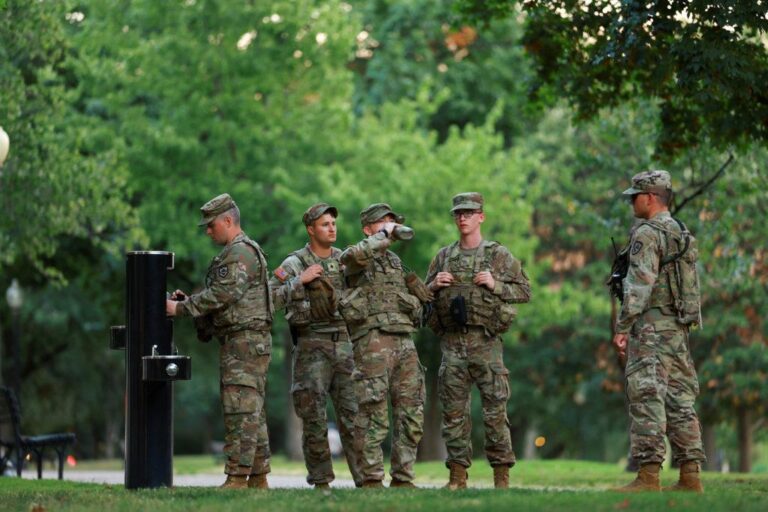Expanded Federal Military Presence Targeting Additional Democratic-Led Urban Centers
The current administration has announced plans to extend the deployment of military personnel to a broader range of major cities governed by Democratic officials. This strategic shift responds to escalating concerns about civil disturbances and the perceived need for enhanced federal intervention to support local law enforcement agencies. Cities with recent histories of protests and unrest have been prioritized for this expanded federal involvement, igniting vigorous discussions among policymakers, civil rights advocates, and community stakeholders.
Among the metropolitan areas under consideration for increased military support are:
- Seattle, Washington
- Chicago, Illinois
- Portland, Oregon
- Philadelphia, Pennsylvania
Opponents warn that such deployments could exacerbate tensions and undermine community trust, while proponents argue that a strong federal presence is essential to safeguard public safety amid rising incidents of unrest. The table below contrasts current security arrangements with the proposed enhancements:
| City | Existing Security Measures | Proposed Enhancements |
|---|---|---|
| Seattle | National Guard | National Guard plus Federal Military Units |
| Chicago | Local Police Forces | Local Police augmented by National Guard |
| Portland | National Guard | National Guard with Additional Federal Support Teams |
| Philadelphia | Local Police Forces | Local Police supplemented by National Guard |
Political Dynamics and Community Feedback on Military Deployments
Political commentators have expressed strong reservations about the federal government’s decision to increase military involvement in Democratic-led cities, viewing it as a potential overextension of federal authority and a catalyst for partisan discord. Critics contend that framing these municipalities as hotbeds of disorder risks deepening political polarization and alienating urban populations. Conversely, advocates maintain that federal intervention is justified to restore stability amid surging protests and civil disturbances, emphasizing that no city should be exempt from receiving necessary support when local resources are stretched thin. This policy has sparked intense debate within Congress, with some Democratic lawmakers accusing the administration of leveraging military deployments as a tactic to intimidate urban voters ahead of upcoming elections.
Responses from affected communities have been varied but predominantly express apprehension about the increasing militarization of public spaces. Demonstrations and town hall meetings have surged in these cities, with residents calling for solutions that address systemic issues such as social inequality and police reform rather than relying on armed forces. Municipal leaders have urged federal agencies to maintain transparency and collaborate closely with local governments to prevent further escalation. The table below summarizes the spectrum of reactions:
| Stakeholder Group | Primary Concern | Position |
|---|---|---|
| City Officials | Threat to local governance and autonomy | Opposed |
| Federal Supporters | Restoration of law and order | Supportive |
| Community Activists | Concerns over civil liberties and militarization | Generally opposed or cautious |
| General Public | Balancing safety with personal freedoms | Mixed opinions |
Implications for Local Authority and Civil-Military Relations
Introducing military forces into urban areas led by Democratic officials presents multifaceted challenges to established local governance frameworks. This approach risks diminishing the authority of elected leaders who traditionally oversee policing and emergency management within their jurisdictions. The presence of federal troops may be perceived as an infringement on municipal sovereignty, potentially heightening friction between city administrations and federal agencies. Key issues include:
- Interference with established law enforcement protocols and public safety operations
- Strained collaboration between local governments and federal entities
- Increased public unease and the possibility of intensified civil unrest
From the perspective of civil-military relations, expanding the military’s role in domestic affairs raises critical questions about the appropriate boundaries between armed forces and civilian law enforcement. Historically, U.S. policy has maintained a clear division to prevent the militarization of public security. This evolving strategy risks blurring those lines, challenging foundational democratic principles and potentially altering public perceptions of safety and governance. The following table outlines anticipated consequences:
| Dimension | Expected Outcome |
|---|---|
| Local Governance | Reduced influence over security decisions |
| Public Trust | Decline due to visible military presence |
| Military Engagement | Expanded role beyond traditional defense functions |
| Community Sentiment | Heightened fear and societal polarization |
Strategies for Strengthening State-Federal Collaboration Amid Rising Tensions
Given the increasing unrest and political polarization, it is crucial to establish effective partnerships between state governments and federal agencies. Prioritizing transparent communication channels will facilitate timely information sharing and coordinated responses. Creating joint task forces that include representatives from both levels of government can help unify objectives and reduce bureaucratic obstacles. These collaborative teams are essential for optimizing resource allocation while safeguarding civil liberties.
Additionally, developing clear, jointly agreed-upon protocols for military deployments can minimize jurisdictional disputes and misunderstandings. Recommended measures include:
- Integrated command structures that clearly delineate responsibilities between federal troops and local law enforcement agencies.
- Community outreach programs designed to build trust and alleviate tensions in affected neighborhoods.
- Regular joint training exercises to prepare for potential escalations and ensure seamless cooperation.
| Coordination Component | Intended Benefit |
|---|---|
| Shared Intelligence Networks | Enhanced situational awareness and responsiveness |
| Oversight Committees | Ensuring adherence to civil rights and legal standards |
| Community Liaison Officers | Mitigating local tensions and fostering dialogue |
Concluding Perspectives on the Expansion of Military Deployments
The proposed increase in military deployments to additional Democratic-led cities represents a notable intensification of the federal government’s approach to managing civil unrest. This development prompts critical reflection on how to balance the imperative of maintaining public order with the need to respect local governance and civil liberties. As these plans progress, close attention will be paid to their effects on community relations, political dynamics, and the evolving role of the military in domestic affairs. Ongoing coverage will track these developments and their broader implications for American society.







